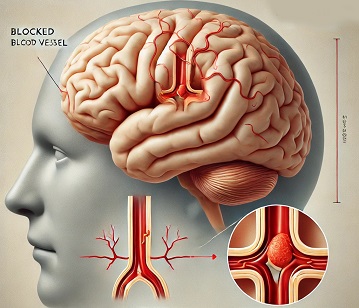Nikhil Prasad Fact checked by:Thailand Medical News Team Jun 22, 2024 9 months, 2 weeks, 6 days, 23 hours, 1 minute ago
COVID-19 News: The COVID-19 pandemic has brought numerous health challenges, including severe respiratory issues and unexpected complications like strokes. Recent research that is covered in this
COVID-19 News report, has delved into the link between COVID-19 and ischemic strokes, focusing on the role of inflammation and how it affects patient outcomes.
 COVID-19 and Stroke: New Insights on Inflammation and Recovery
Understanding Ischemic Stroke
COVID-19 and Stroke: New Insights on Inflammation and Recovery
Understanding Ischemic Stroke
An ischemic stroke occurs when a blood clot blocks a blood vessel in the brain, reducing blood flow and causing brain cells to die. This blockage can lead to significant brain damage, physical disabilities, and even death. It's the most common type of stroke and requires immediate medical attention to restore blood flow and minimize brain damage.
The Study's Purpose
A team of researchers from Shenzhen, China, sought to understand how COVID-19 influences stroke patients. They conducted a comprehensive study comparing patients who had strokes after contracting COVID-19 with those who had strokes without the infection. This research is particularly timely given the relaxation of COVID-19 control measures and the subsequent increase in infections in China.
Key Findings
-Higher Inflammation Levels
One of the significant findings of the study was that patients with COVID-19-related strokes had higher levels of specific inflammatory markers in their blood. These markers included monocytes, fibrinogen, and C-reactive protein (CRP). Inflammation is the body's response to infection or injury, and elevated levels can worsen stroke outcomes by causing additional damage to brain tissue and complicating recovery.
-Differences in Blood Cell Counts
The study also revealed notable differences in the blood cell counts between COVID-19 stroke patients and non-COVID-19 stroke patients. COVID-19 stroke patients had higher monocyte counts but lower lymphocyte and eosinophil counts. These differences suggest a heightened inflammatory state in COVID-19 stroke patients, which could influence their overall health and recovery process.
-No Significant Difference in Prognosis
Despite the higher levels of inflammation, the study found no significant difference in the short-term discharge outcomes between the two groups. Both COVID-19 stroke patients and non-COVID-19 stroke patients had similar rates of independence and dependency at discharge. This suggests that the overall stroke severity and immediate recovery might not be significantly influenced by COVID-19, at least in the short term.
Understanding the Inflammatory Markers
Inflammatory markers are substances in the blood that indicate the presence of inflammation in the body. These markers can provide valuable insights into the body's response to injury and infection. In the context of stroke, understanding these m
arkers can help medical professionals assess the severity of the stroke and develop appropriate treatment plans.
Key Markers Studied
-Monocytes: A type of white blood cell that plays a crucial role in the immune response. Elevated monocyte levels indicate an active immune response to infection or inflammation.
-Fibrinogen: A protein involved in blood clot formation. High levels of fibrinogen can contribute to clotting disorders and increase the risk of stroke.
-C-reactive protein (CRP): A protein that increases in response to inflammation. High CRP levels are often seen in conditions involving significant inflammation, such as infections and autoimmune diseases.
Implications for Treatment - Anti-Inflammatory Therapies
Given the elevated inflammatory markers in COVID-19 stroke patients, there may be a potential benefit to using anti-inflammatory treatments. Reducing inflammation could help improve outcomes and support faster recovery. Anti-inflammatory medications and treatments could be considered as part of a comprehensive care plan for these patients.
Need for Further Research
While this study provides valuable insights, more research is needed to fully understand the long-term effects of COVID-19 on stroke patients and the potential benefits of targeted anti-inflammatory treatments. Future studies could focus on the effectiveness of various anti-inflammatory therapies and their impact on long-term recovery and quality of life for stroke patients.
The Bigger Picture - COVID-19's Broad Impact
The findings highlight the broad impact of COVID-19, extending beyond respiratory issues to serious neurological conditions like strokes. This underscores the importance of comprehensive medical care for COVID-19 patients, especially those with pre-existing conditions or who suffer from complications like strokes. Understanding the full spectrum of COVID-19's effects can help healthcare providers better manage and treat affected patients.
Conclusion
The study reveals critical insights into the connection between COVID-19 and ischemic strokes, particularly the role of inflammation. While the immediate prognosis for COVID-19 stroke patients may not differ significantly from non-COVID-19 stroke patients, the elevated inflammatory markers suggest potential areas for therapeutic intervention. Ongoing research and attention to anti-inflammatory treatments could improve outcomes for these patients in the future.
Final Thoughts
As the world continues to navigate the COVID-19 pandemic, studies like this are essential for understanding the broader implications of the virus. By identifying the connections between COVID-19 and other severe health conditions, healthcare professionals can develop more effective treatment strategies and improve patient outcomes. The fight against COVID-19 is multifaceted, and ongoing research will play a crucial role in overcoming the challenges posed by this global health crisis.
The study findings were published in the peer reviewed journal: Acta Neurologica Scandinavica.
https://onlinelibrary.wiley.com/doi/10.1155/2024/9022806
For the latest
COVID-19 News, keep on logging to Thailand Medical News.
Read Also:
https://www.thailandmedical.news/news/breaking-news-latest-study-covering-23-million-patients-shows-that-post-covid-individuals-have-a-63-7-percent-risk-of-developing-ischemic-stroke
https://www.thailandmedical.news/news/covid-19-news-numerous-studies-and-emerging-data-are-warning-that-strokes-and-heart-failures-are-a-serious-threat-for-post-covid-individuals
